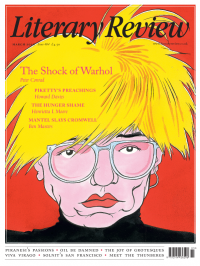Blair Worden
God’s Own Countries
The Puritans: A Transatlantic History
By David D Hall
Princeton University Press 517pp £27
No one likes to be called a puritan. In the 16th and 17th centuries, when the word began with a capital letter and denoted not merely a temperament but also a religious affiliation, it was a term of abuse, disowned by those at whom it was thrown. Playwrights drew on, and perhaps even helped to create, images of sullenness, unsociability and hypocrisy. In Twelfth Night, where Malvolio is said to be ‘a kind of Puritan’, Sir Toby famously asks him, ‘Dost thou think, because thou art virtuous, there shall be no more cakes and ale?’ Puritans were allegedly identifiable by their nasal whines and the lifting of their eyes to heaven. For Ben Jonson, who lampooned ‘the holy brethren’ in the characters of Tribulation Wholesome and Zeal-of-the-Land Busy, to ‘turn Puritan’ was to ‘learn to speak in the nose’.
The animus of dramatists was stiffened by the Puritan antipathy to the theatre, but the derisive deployment of the term extended far beyond literature. David Hall, whose long and learned book traces the ‘Puritan movement’ in England, Scotland and New England, quotes a complaint by a Scottish minister in

Sign Up to our newsletter
Receive free articles, highlights from the archive, news, details of prizes, and much more.@Lit_Review
Follow Literary Review on Twitter
Twitter Feed
The Soviet double agent Oleg Gordievsky, who died yesterday, reviewed many books on Russia & spying for our pages. As he lived under threat of assassination, books had to be sent to him under ever-changing pseudonyms. Here are a selection of his pieces:
Literary Review - For People Who Devour Books
Book reviews by Oleg Gordievsky
literaryreview.co.uk
The Soviet Union might seem the last place that the art duo Gilbert & George would achieve success. Yet as the communist regime collapsed, that’s precisely what happened.
@StephenSmithWDS wonders how two East End gadflies infiltrated the Eastern Bloc.
Stephen Smith - From Russia with Lucre
Stephen Smith: From Russia with Lucre - Gilbert & George and the Communists by James Birch
literaryreview.co.uk
The dropping of the atomic bomb on Hiroshima in August 1945 has long been regarded as a historical watershed – but did it mark the start of a new era or the culmination of longer-term trends?
Philip Snow examines the question.
Philip Snow - Death from the Clouds
Philip Snow: Death from the Clouds - Rain of Ruin: Tokyo, Hiroshima, and the Surrender of Japan by Richard Overy
literaryreview.co.uk